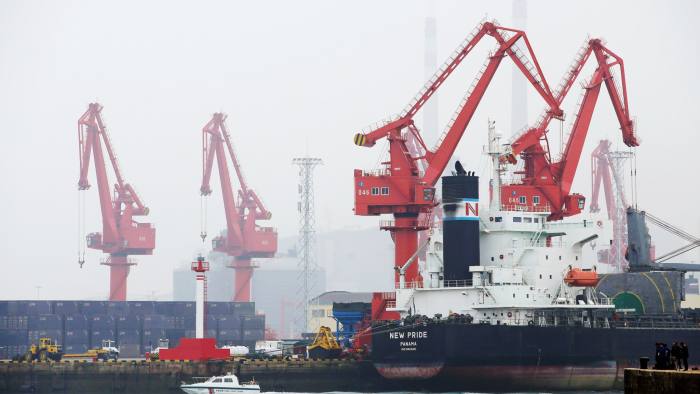Beijing’s reaction to America’s assertion of power could reshape markets
Nick Butler

A crude oil tanker at Qingdao Port in China’s Shandong province. The country’s oil imports have risen rapidly over the past decade © Reuters
China is now fully part of the global energy trading system, regularly importing more than 9m barrels a day of oil and a rapidly growing amount of natural gas. But Beijing faces an American assertion of power that threatens to disrupt the current pattern of trade, not least in energy. The Chinese reaction could reshape markets we take for granted.
The first American action is direct: a war of competing tariffs on trade between the US and China that affect everything from washing machines to rice and even baseballs.
The second is indirect: the US sanctions against Iran that prohibit trade between third countries and Iran including trade in oil. Initially exemptions on such trade were granted to a number of countries including India and China, but in May the US began withdrawing those exemptions.
The tariff war is the subject of much bluster with threats and counter threats, but given the interests of both economies in maintaining an open trading relationship, it seems reasonable to expect that a deal will eventually be done.
The sanctions issue is more complicated, not least because of the decades of hostility between the US and Iran going back to the 1953 overthrow of the Iranian prime minister Mohammed Mossadeq and the occupation and hostage taking at the US embassy in Tehran between November 1979 and January 1981.
The issue is made more complex by the absence of any obvious mutually acceptable resolution of the question of Iran’s nuclear activity. Given that US president Donald Trump has rejected the multilateral agreement reached in 2015, it is difficult to see what, short of a full-scale regime change, will satisfy him and his national security adviser John Bolton.
Military action between the US and iran is possible, and even tighter sanctions are more likely. Seen from Beijing, the problem is that the principal loser from a conflict (in addition to the people of Iran) would be China itself.
Chinese oil imports have risen rapidly during the past decade. The country may have 2.5m electric vehicles but it also has more than 300m registered vehicles running on diesel and petrol, along with an expanding internal air travel sector. Oil has become inseparable from economic activity and is essential to satisfying the consumer needs of China’s growing middle class.
Almost half — 44 per cent — of China’s oil imports come from the Middle East. As the US becomes ever more self-reliant in oil and gas thanks to the shale revolution, the natural destination for Middle East oil is Asia rather than America. If Iran’s oil trade is cut off — either by sanctions or by a physical conflict that closes the Strait of Hormuz — China will be among the first to feel the implications. Energy security is now a Chinese issue.
In the short term, China is likely to buy any oil it needs, which would no doubt force up world prices. The country’s imports unexpectedly rose to more than 10m barrels per day in April, presumably to boost stocks ahead of any crisis, and this almost certainly helped strengthen world prices.
Longer term, the reminder of China’s vulnerability to US actions will focus attention on the challenge of its dependence on outside sources for commodities that have become essential for continued economic success. The result is likely to be a more mercantilist policy on energy trade. If an open trading system cannot be replied upon, Beijing will resort to bilateral deals — securing specific supplies of oil, and perhaps gas too, through direct state-to-state barter deals using all the tools it can offer, from cheap loans to political support and the supply of military and other equipment.
Such an approach will go well beyond the limited steps taken so far. A serious bilateral oil-trade plan would include direct investment and ownership of resources and the accelerated development of Chinese companies into multinationals capable of finding and producing energy resources around the world.
For Beijing, this step is logical and would be a completely understandable response to a US assertion of extraterritorial power over the world market. For the rest of us the move will be dangerous. If China ties up 9m or 10m b/d of oil — in April imports reached 10.6m b/d, up 11 per cent on April 2018 — under bilateral deals, the market that remains will be smaller and potentially much more volatile.
The writer is an energy commentator for the FT and chair of The Policy Institute at King’s College London
0 comments:
Publicar un comentario